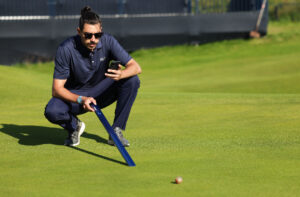Vicky Aitken is the Ladies European Tour’s official Sports Psychologist. Here she explains what her work entails…
Vicki, you have been working with the LET for seven years now. Why do players generally come and visit you?
I first came out on Tour in 2001. Usually players come to see me because they’re struggling with their game or perhaps they believe that their mental game is not as good as it could be. However sometimes I see people who want to take their game to the next level and haven’t gone down that route before. Most of the rookies and younger players have had sports psychology in their careers already. It’s a slightly different breed of player on Tour now. They’re not naive and they’ve had some experience of sports psychology but some come to see me because I’m on Tour and more accessible than those form their home town.
How are sports psychologists sessions run generally?
I usually have an office at LET tournaments. We sit down and go through their situation and usually it involves taking on some sports psychology skills. Then it’s a matter of applying them. We might go to the range or we might go to the tournament course. I always watch the player play at least three holes and then we chat at the end and I give them feedback. If they’ve been working on their pre-shot routine for example then we check whether they did their routine consistently or did they alter it after they had taken a double bogey for example!
What sort of questions do you ask players?
Every type of question! It’s important for me to have an understanding of what’s going on in a player’s life because there may be outside effects in their lives. Obviously I ask a lot of questions on their thoughts on the golf course. I ask open ended questions that get them to think. If you read my new book, Caddy Talk, for example, Mark Fulcher, a Tour caddy, said he tries to get the player to think they have come up with a solution themselves which is exactly what I do. In the event they can take their own advice and own it! That’s the main thing.
What is the most common advice that you give to the pros?
I guess if there is an area we work on, with women as a whole, confidence is always a big factor. If you’ve just won a tournament your confidence is high but if you’ve missed several cuts then confidence can be low. It’s getting to maintain your confidence level and getting it continually up that is always the challenge. You have to remember that you can’t control what other people do.
How do you get players to improve their confidence?
One example you always work on is self talk, i.e. what you say to yourself! You want players to be positive and be their own best friend out on the golf course. It’s not rocket science, it is very logical, but you put it in a way that is accessible.
Can you give an example of a time it worked really well?
It always works really well! This is something I have covered with every golfer I’ve worked with.
On your website, you write that you advise players to “sail their own boats”. How exactly do you enable them to do this?
It goes back to what I said before about empowering people. Everybody is an individual. An outgoing Australian or American for example is going to take it differently to someone from Scandinavia, Germany or Britain for example. Then the Germans, Spanish and French approach it differently. There are cultural differences and then as an individual within that. I get them to come up with their own interpretations of how to use self talk. Are they the kind of player that works off fist pumping when they sink a birdie or are they the person that doesn’t need external praise. They can quietly achieve. There are players that have seen me that know all the systems and have the discipline to continue with it themselves.
Can a player apply those skills off the golf course?
Yes, very much so. I’ve just written an article for a New Zealand golf magazine going back to self talk. For example if you’re just talking to your friends over a beer after work and chatting casually, do you chat positively or negatively? Do you talk about all the stuff that went wrong or all the stuff that went right and what can get better? If you can employ positive thinking in every area of your life it happens everywhere and vice versa. If you are able to make the change on the golf course it can work off the golf course.
You have recently written a book called “Caddy Talk”. Do you give advice to Tour caddies?
I’ve worked with players and caddies and I’ve worked with caddies who have come to me directly for advice on a one-to-one basis irrespective of their players.
What sort of advice do you give to caddies?
It can vary but it’s often about communication. If you can’t communicate with your player then you can get into trouble in a big hurry.
What types of people benefit from sports psychology?
Well golfers will see an improvement in their performance in the long run. My players have won seven tournaments whilst I was working with them. For some people who struggle to make the cut, if they are starting to make top ten finishes then that is a significant improvement.
How does your book aim to help golfers?
The book can help golfers, particularly if they are going to utilise the services of a caddy. There are tips for players on how to boost their confidence; how to go and achieve their goals and how to increase their chances of achieving them! A Tour player asked me if it was only for caddies and I said for her it would be interesting to see how she can get the most out of her caddy. Nobody has ever written a book on the psychology of caddying before so I thought it was a dynamic that had been neglected.
You often place motivational phrases up at LET tournaments. What are your most popular ones?
Last year one that was popular was: “Some men see things as they are and say why. I dream things that never were and say why not?” (George Bernard Shaw).
What is most rewarding about being a sports psychologist?
When you know you’ve made a difference to a player and their career and it has happened several times.
You can buy Vicki Aitken’s book, Caddy Talk, online at www.caddy-talk.com. Alternatively you can visit Vicki Aitken’s website to find out when she will be attending Ladies European Tour tournaments at: www.vickiaitken.com



















